PHISHING INDEX
Below are the most common email phishing attempts detected by the TG Soft Anti-Malware Research Center in July 2025:
21/07/2025 =>
Aruba - Unsent messages
14/07/2025 =>
PayPal
14/07/2025 =>
Aruba - Invoice expired
10/07/2025 =>
GoDaddy
10/07/2025 =>
Phishing Sondaggio - Mediaworld / UNIPOL
08/07/2025 =>
SexTortion
06/07/2025 =>
FedEx
05/07/2025 =>
Aruba - Domain expired
04/07/2025 =>
Phishing Sondaggio - LEROY MERLIN / IKEA
01/07/2025 =>
PagoPA
01/07/2025 =>
Aruba - Account verification
These emails aim to deceive unsuspecting victims into providing sensitive information, such as bank account details, credit card codes, or personal login credentials, with all the easily imaginable consequences.
21 July 2025 ==> Phishing Aruba - Unsent Messages
SUBJECT <
Important notice: you have (2) unsent messages>
Phishing attempts pretending to be communications from the
Aruba brand, continue.
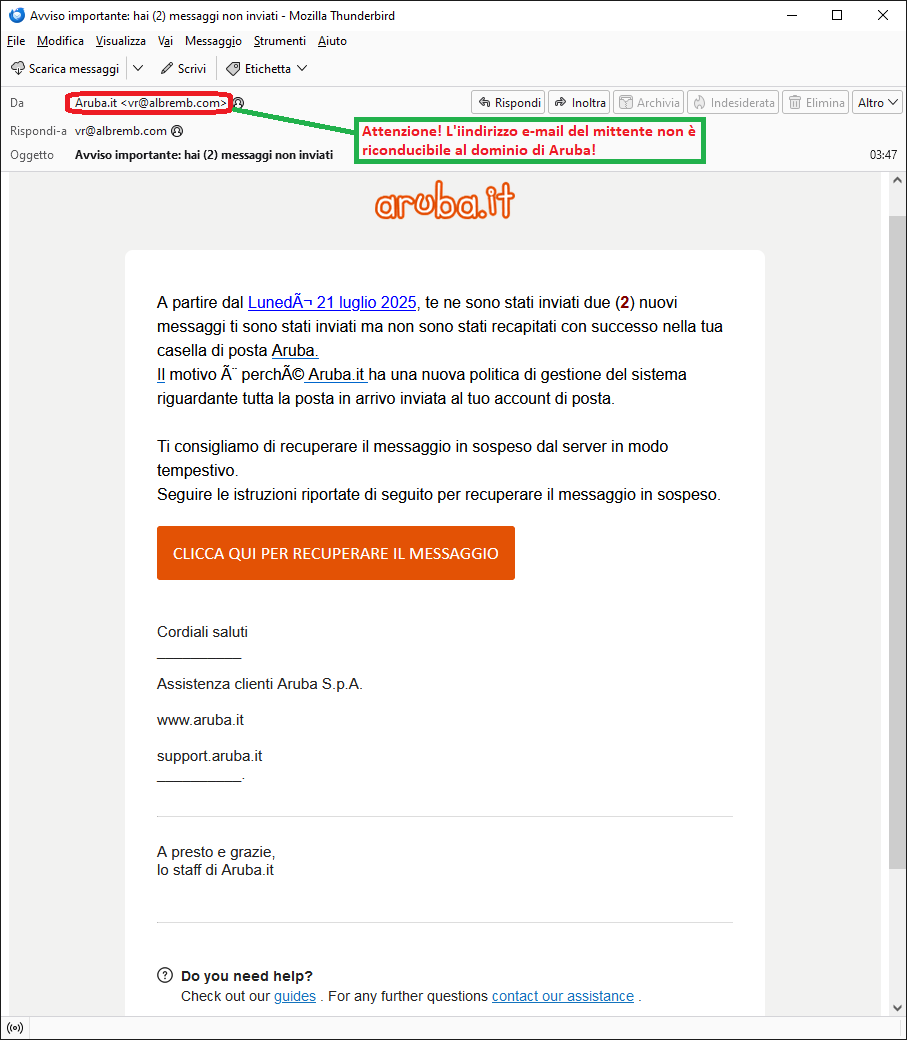 The message informs the receiver that as of today 21 July 2 new messages have arrived, which however have not been delivered to the mailbox hosted on Aruba. The reason for the undelivered messages seems to be a new management policy of incoming mail adopted by Aruba. It therefore invites the user to retrieve the suspended message through the following link:
The message informs the receiver that as of today 21 July 2 new messages have arrived, which however have not been delivered to the mailbox hosted on Aruba. The reason for the undelivered messages seems to be a new management policy of incoming mail adopted by Aruba. It therefore invites the user to retrieve the suspended message through the following link:
CLICK HERE TO RETRIEVE THE MESSAGE
Clearly, the well-known web hosting, e-mail and domain registration services company
Aruba, is uninvolved in the mass sending of these e-mails, which are real scams whose goal remains, as always, to steal the unsuspecting recipient's sensitive data.
When we carefully analyse the message, we find some clues that should make us suspicious. We first see that the text of the e-mail is generic and written in incorrect Italian. Furthermore, the e-mail address of the message <
vr[at]albremb[dot].com> is not traceable to the official domain of
Aruba, a very anomalous fact. Another red flag is that in order to confirm, you are asked to enter your account credentials via a link provided by e-mail
Anyone who unluckily clicks on the link
CLICK HERE TO RETRIEVE THE MESSAGE
will be redirected to a web page that, although it visually mimics the login page of an
Aruba account - since the cybercriminal took care to include thelogo of the company - is not at all trustworthy.
In this case too, the address/domain is anomalous:
https[:]//digilake[.]sa[.]com/****
On this page, the user is invited to log in to his/her customer area with his/her e-mail login and password to retrieve messages before deletion.
We always urge you not to be in a hurry, to pay attention to every detail, even trivial ones, and not to enter your personal data and/or passwords on forms hosted on counterfeit web pages, as these will be delivered to cyber criminals who will use them for criminal purposes.
14 July 2025 ==> Phishing PayPal
SUBJECT <
Important update on your account>
We analyse below a new phishing attempt aimed at stealing the login credentials of the account of
PayPal, the well-known US digital payments company.
The message warns the recipient that for security reasons his/her account will be updated and temporarily suspended. It then informs him/her that he/she can update his/her information immediately to avoid account suspension, through the following link:
>Update as you know.
When we analyse the message, we see that its email address <
ew-alerts[at]dtihost[dot].com> is not related to the official domain of
PayPal. This is definitely abnormal and should make us suspicious.
Whoever unfortunately clicks on the
>Update as you know.
. link will find himself/herself facing the screen shown in the image on the side. As we can see, he/she are redirected to a site that visually mimics the
PayPal login page. However, this page is hosted on an unusual address/domain.
For these reasons, we advise you NOT to ever enter your credentials on sites whose origin you do not know, as they will be sent to a remote server, and used by cyber crooks with all the risks you can easily imagine.
14 July 2025 ==> Phishing Aruba - Invoice expired
SUBJECT: <
[Aruba.it]: Invoice expired (3) last reminder!>
Phishing attempts, pretending to be communications from the
Aruba brand, continue.
The message warns the recipient that the invoice concerning the renewal of his
Aruba services is still awaiting settlement, after 3 reminders. The service has been temporarily suspended due to non-payment and will be automatically reactivated when the outstanding amount is paid. Then the message gives detail of the invoice <
Order number: INV-2025-6296> and provides the link for the payment:
MAKE THE PAYMENT
The well-known web hosting, e-mail and domain registration services company
Aruba, is clearly uninvolved in the mass sending of these e-mails, which are real scams whose goal remains, as always, to steal the unsuspecting recipient's sensitive data.
When we analyse the message we immediately notice that it comes from an address <
noreply(at)bussolocean(dot)com> which does not refer to the official domain of
Aruba. It is essential to always be very careful before clicking on suspicious links.
Whoever unfortunately clicks on the
MAKE THE PAYMENT link, will be redirected to the displayed webpage..
On this page, the user is invited to access his/her customer area with login data to pay the bill and reactivate the suspended services.
Although the site may be misleading due to the presence of the well-known
Aruba logo, the URL address of the browser is anomalous and cannot be traced back to the company's official domain.
https[:]//fatturazione-customerarea[FakeDomainName*].com/1/aruba-login
If you enter your data into counterfeit websites, in fact, it will be delivered to the cyber-criminals behind the scam who will use it for criminal purposes. We therefore urge you not to rush and always pay attention to every detail, even trivial ones.
10 July 2025 ==> Phishing GoDaddy
SUBJECT: <
Action Required: Please Update Your Payment Information>
We analyse below the phishing attempt pretending to be a communication from
GoDaddy, a US company that provides hosting and Internet domain registration.
The message, in English, informs the recipient that the renewal of
GoDaddy services could not be completed, due to the current payment method indicated. To avoid the suspension of the services, the user is requested to update the payment information promptly.
It then invites the user to update the payment method via the following link:
Update Payment
Clearly, the well-known web hosting, e-mail and domain registration service company,
GoDaddy, is uninvolved in the mass sending of these e-mails, which are real scams whose goal remains, as always, to steal sensitive data of the unsuspecting recipient.
When we analyse the message, we immediately see that the sender's e-mail address <
dh_6j4wrz[at]vps65269[dot]dreamhostps[dot]com> is not from the official domain of
GoDaddy.
Anyone who unluckily clicks on the
Update Payment link, will be directed to the displayed page.
As we can see, firstly, the landing page is well-designed and reasonably mimics the official
GoDaddy website.
We can see that the landing page in this case is hosted on the url address:
https[:]//[FakeDomainName*]godaddyes/assets/ which is unrelated to the official website of the company.
We therefore urge you not to rush and always pay attention to every detail, even trivial ones.
If you to enter the requested data, specifically credit card details, it will be delivered to the cyber-criminal creators of the scam who will use it for malicious purposes.
10 July 2025 ==> Phishing customer survey: Mediaworld - UNIPOL
Customer survey-themed phishing campaigns, exploiting well-known brands, continue. In the two cases described below, the companies are large-scale retailers and insurance companies.
In the first reported example, the cybercriminal used the well-known brand name of
Mediaworld,which appears to be promoting a message offering the chance to win an exclusive prize: a <
G3 Ferrari Pasta Maker - Mixer and Sheeter>. To claim the prize, recipients just have to answer a few short questions.
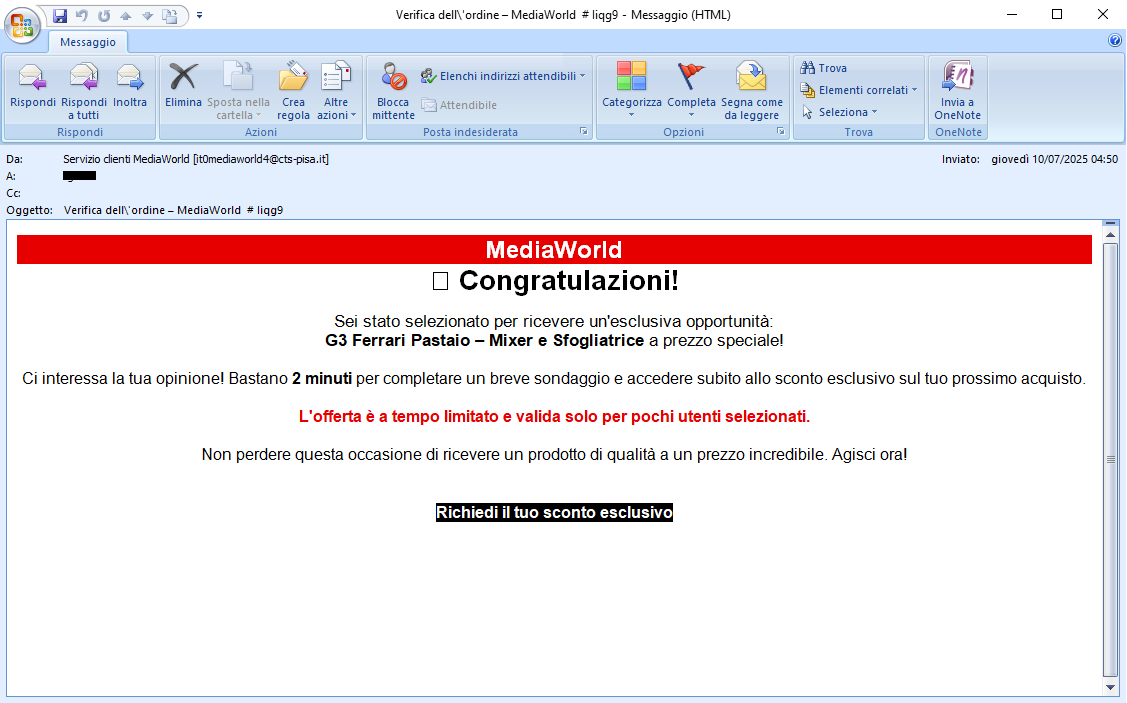
In the second reported example, apparently from
UNIPOL, the lucky user appears to have been chosen for participation in the company's loyalty program,which allegedly offers a FREE latest-generation <
Car Emergency Kit> ...
The brands exploited in these campaigns are clearly unrelated to the mass sending of these malicious e-mails, which are outright scams whose goal remains, as always, to steal sensitive data of the unsuspecting recipient.
In the two examples above the emails clearly come from addresses <it0mediaworld4[at]cts-pisa[dot]it>and <it764tdfj[at]maninox[dot]it>unrelated to the official domain of
Mediaworld or
UNIPOL. This is definitely anomalous and should certainly make us suspicious.
When we click on the links in the e-mail, we are directed to a landing page that may look graphically deceptive (with misleading images and the brand's authentic logo), but is hosted on an abnormal address/domain that is not trustworthy or traceable to the exploited brand.
The cybercriminals behind the scam, in order to achieve their goal, use various tricks, such as reporting false testimonials from customers who have won the prize. They try to persuade the user to complete the survey quickly, by making him/her believe that only a few can win, and that the offer expires today.
Surely if so many users were lucky why not try our luck?
When the survey is completed, the user is usually sent to a page for the entry of the shipping address and subsequent payment of shipping costs.
The cybercriminals' purpose, is to induce the victim to enter his/her personal information to ship the prize and then, likely, also the credit card information to pay the shipping costs.
To conclude, we always urge you to be wary of advertising/promotional messages that boast of "giving away" valuables, and avoid clicking on suspicious links whose links may lead to a counterfeit site. In fact, if you trust these messages, your most valuable data is stolen by cyber crooks who can use it at will.
08 July 2025 ==> SexTortion
The SexTortion-themed SCAM campaign is back. The e-mail seems to hint that the scammer had access to the victim's device. In fact, he appears to have used it to collect data and personal videos and then blackmailed the user by demanding payment of a sum of money, in the form of Bitcoin, not to divulge among his/her email and social contacts a private video of him/her looking at adult sites.
Below is an extract from the text of the email shown on the side:
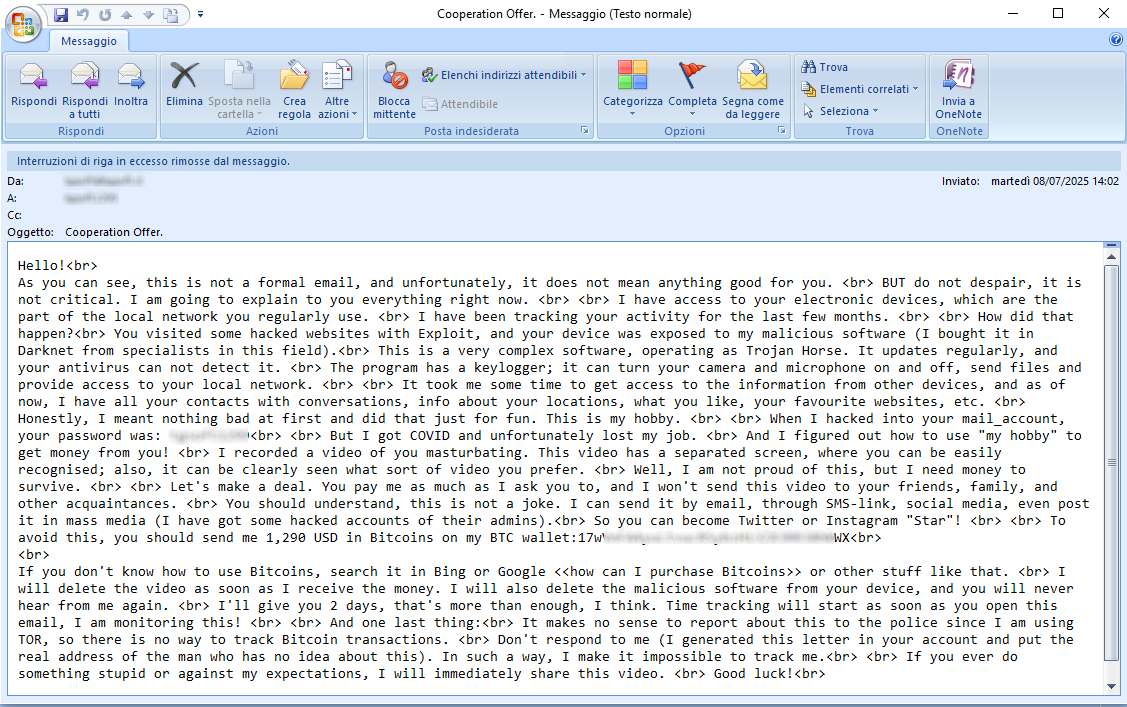
"As you can see, this is not a formal email, and unfortunately, it does not mean anything good for you. But do not despair, it is not critical. I am going to explain to you everything righy now. I have access to your electronic devices, which are the part of the local network you regularly use. I have been tracking your activity for the last few months. How did that happen? You visited some hacked websites with Exploit, and you device was exposed to my malicious software (I bought it in Darknet from specialists in this field). This is a very complex software, operating as a Trojan Horse. It updates regularly, and your antivirus can not detect it. The program has a keylogger; it can turn your camera and microphone on and off, send filesand provide access to your local network. It took me som time to get access to the information from other devices,, and as of now, I have all your contactswith conversations , info about your locations, what you like, yor favourite websites, etc. Honestly, I meant nothing bad at first and that just for fun. This is my hobby. When I hacked into your email account, your password was:***. But I got Covid and unfortunately lost my job. And I figured out how to use “my hobby” to get money from you! I recorded video of you .. This video has a separated screen, where you can be easily recognised; also, it can be clearly seen what sort of video you prefer. Well, I am not proud of this, but I need money to survive. Let’s make a deal. You pay as much as I ask you to, and I won’t send this videoto your friends, family, and other acquaintances. You should understand, this is not a joke......."
The hacker claims to have gained access to the victim's device and, as proof of this, also provides a user password. In addition, the cybercriminal attempts to build empathy with the user by justifying his actions as a result of losing his job due to Covid. In order to prevent the video from being released, the victim is asked to send 1,290 USD in Bitcoin to the wallet listed below: "
17wXXXXXXXXXXXXXxXXXXXXXXWX'. After receiving the payment, all data will be deleted. Otherwise, a video depicting the user will be sent to all colleagues, friends and relatives. The unfortunate victim has two days to pay!
As of
10/07/2025, there are no transactions on the reported wallet.
In such cases we always invite you:
- not to respond to these kinds of emails and not to open attachments or click unsafe links, and certainly NOT to send any money. You can safely ignore or delete them
- if the criminal reports an actual user’s password – usually it is a password obtained from public Leaks (compromised data theft) of official sites occurred in the past (e.g., LinkedIn, Yahoo, etc.) - it is recommended to change it and enable two-factor authentication on that service.
06 July 2025 ==> Phishing FedEx
SUBJECT: <
FINAL REMINDER - CASE NUMBER 98230000214>
Below, we analyse a new attempt at data theft that comes in the form of a fake message from the well-known courier
FedEx.
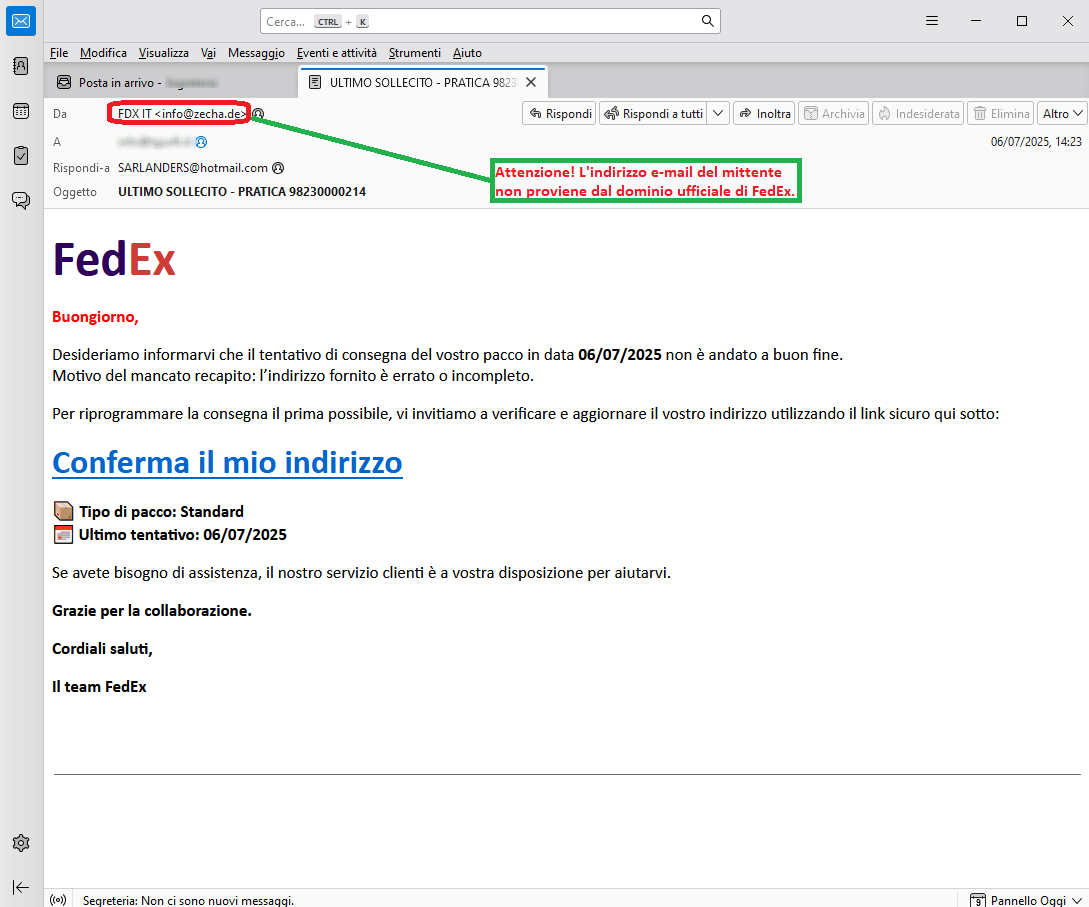
The message, shown on the side, warns about the need to reschedule a delivery, as the previous delivery attempt on 06/07/2025 was unsuccessful because: ‘the address provided is incorrect or incomplete’. To unblock the delivery, it seems necessary to confirm the shipping details and reschedule the delivery via the following link:
Confirm my address
When we look at the email <info[at]zecha[dot]de>, we see that its address doesn't match FedEx's official domain. This is definitely weird and should make us suspicious.
FedEx is clearly not involved in sending these malicious campaigns, which are outright scams whose goal, as always, is to steal sensitive data from unsuspecting recipients.
Anyone who unfortunately clicks on the Confirm my address link, will be redirected to a web page that is designed to look like the official website of FedEx, but which has already been reported as a DECEPTIVE WEBSITE. In fact it is run by cyber-criminals whose goal is to get hold of your most valuable data in order to use it for criminal purposes. We always urge you to pay attention to even the smallest details and not to enter your personal and/or credit card details on forms hosted on fake web pages, as they will be sent to a remote server and used by cyber fraudsters.
05 July 2025 ==> Phishing Aruba - Domain expired
SUBJECT: <
Warning: your domain **** may be lost>
Phishing attempts pretending to be communications from the
Aruba brand continue
The message informs the recipient that his/her domain hosted on
Aruba has expired today. It then informs him/her that in order to avoid service interruptions, he/she can immediately renew the domain at a cost of € 5.99 via the following link:
Renew Now
Let's always be careful about requests to enter personal credentials via suspicious links sent by email. Clearly, the well-known web hosting, email and domain registration company
Aruba is not involved in sending these mass emails, which are genuine scams whose aim, as always, is to steal sensitive data from unsuspecting recipients.
We immediately see that the email address of the message <
emaa[at]chimana[dot]it> does not belong to the official official domain of
Aruba. This is definitely unusual and should make us suspicious.
To induce the victim to act quickly, the cybercriminal gives him or her little time to respond. This technique is clearly intended to intimidate the user, who, fearing that he or she will be unable to access his or her account and use the services linked to it, is prompted to act without paying due attention.
Anyone who unluckily clicks on the link, will be redirected to an anomalous WEB page, which has already been reported as DECEPTIVE WEBSITE/PAGE. In fact it is run by cyber-criminals whose goal is to get hold of your most valuable data in order to use it for criminal purposes.
04 July 2025 ==> Phishing customer survey: LeroyMerlin / IKEA
Customer survey-themed phishing campaigns, exploiting well-known brands, continue. In the two cases described below, the companies are large-scale retailers.
In the first example, the cybercriminal used the well-known
IKEA brand, which appears to be launching a promotional message offering the chance to win an exclusive prize: an <
IKEA 365+ cookware set>. To claim the prize, all the recipient has to do is answer a few short questions.
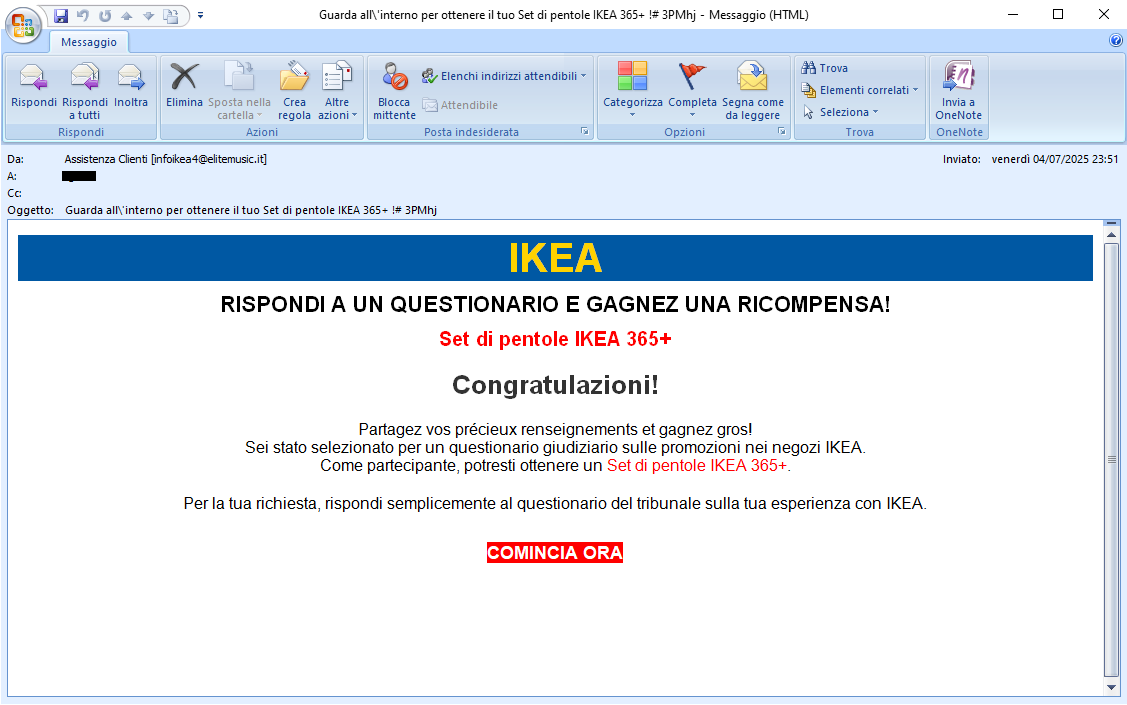
In the second example, allegedly from the well-known company
Leroy Merlin, the lucky user appears to have been chosen to participate in the loyalty programme, which would allow him/her to obtain a
GORILLA GARDEN TROLLEY for FREE!...
The brands exploited in these campaigns are clearly unrelated to the mass sending of these malicious e-mails, which are outright scams whose goal remains, as always, to steal sensitive data of the unsuspecting recipient.
In the two examples above we see that the emails clearly come from addresses <
infoikea4[at]elitemusic[dot]it> and <
it00merly1[at]ebanisteriascaringella[dot]it>unrelated to the official domain of
IKEA, or
Leroy Merlin. This is definitely anomalous and should certainly make us suspicious.
When we click on the links in the e-mail, we are directed to a landing page that may look graphically deceptive (with misleading images and the brand's authentic logo), but is hosted on an abnormal address/domain that is not trustworthy or traceable to the exploited brand.
The cybercriminals behind the scam, in order to achieve their goal, use various tricks, such as reporting false testimonials from customers who have won the prize. They try to persuade the user to complete the survey quickly, by making him/her believe that only a few can win, and that the offer expires today.
Surely if so many users were lucky why not try our luck?
When the survey is completed, the user is usually sent to a page for the entry of the shipping address and subsequent payment of shipping costs.
The cybercriminals' purpose, is to induce the victim to enter his/her personal information to ship the prize and then, likely, also the credit card information to pay the shipping costs.
To conclude, we always urge you to be wary of advertising/promotional messages that boast of "giving away" valuables, and avoid clicking on suspicious links whose links may lead to a counterfeit site. In fact, if you trust these messages, your most valuable data is stolen by cyber crooks who can use it at will.
01 July 2025 ==> Phishing PagoPA
SUBJECT <
amount still due>
We analyse this month the following phishing attempt pretending to be a communication from
PagoPA, the well-known payments system serving public administrations and utilities in Italy.
The message warns the recipient of a late payment for a traffic violation, including reference number <
R7230033407> and the reason for the violation: <speeding>.
It then shows the amount of the unpaid fine, i.e.
€ 198.00. The recipient is subsequently invited to pay within 72 hours in order to avoid surcharges, otherwise the amount will be increased to € 396.00, in addition to the deduction of 6 points from the driving licence. Finally, it provides the link for the payment:
Check and Pay Now
Clearly, the well-known digital payment platform is uninvolved in the mass sending of these e-mails, which are real scams whose goal remains, as always, to steal the sensitive data of the unsuspecting recipient.
If we analyse the message carefully, there are some suspicious clues. We immediately notice that its email address <
support[at]psy4pro[dot]ru> cannot be traced back to the official domain of
PagoPA. This fact is definitely abnormal, and should make us suspicious.
Anyone who unluckily clicks on the Check and Pay Now link will be directed to a web page which, as we can see from the image on the side, is graphically well designed and simulates quite well the official site of PagoPA.
We can see, however, that the landing page has a url address: url:
https[:]//[FakeDomainName*]/... unrelated to the official site of the company.
We always urge you to pay attention to even the smallest details and not to enter your personal and/or credit card information on forms hosted on counterfeit web pages, as it will be sent to a remote server and used by cyber crooks.
01 July 2025 ==> Phishing Aruba - Account verification
SUBJECT: <
Verify your email address_(*******) 6/30/2025 7:11:07 p.m.>
Here we find another phishing attempt claiming to be a communication from the
Aruba brand.
The message warns the recipient that he/she must verify his/her identity linked to the domain hosted on
Aruba. It then informs him/her that in order to avoid service interruptions, he/she must confirm his/her identity within 72 hours via the following link:
Confirm now
We immediately see that the email is generic, but it does include the name of the account that matches the recipient of the message. Furthermore, it comes from an email address not linked to the domain of
Aruba but seems to come from the domain of the recipient <
Noreply(at)******>. This is definitely unusual and should make us suspicious.
Clearly, the well-known web hosting, e-mail and domain registration services company
Aruba is unrelated to the mass sending of these e-mails, which are real scams whose goal remains, as always, to steal sensitive data of the unsuspecting recipient.
Anyone who unluckily clicks on the
Confirm now link, will be redirected to a web page which, although graphically well designed – the cybercriminal has had the foresight to include the
Aruba logo – is not at all trustworthy. Again, the address/domain is unusual and is not related to the official website of
Aruba.
On this page, the user is asked to log in to his/her customer area by entering his/her login and password, in order to confirm his/her identity and avoid malfunctions/blocks.
We always encourage you to pay attention to every detail, even the minor ones, to avoid rushing, and to refrain from entering your personal data and/or passwords on forms hosted on fake web pages. These details, in fact, will be sent to the cybercriminals behind the scam, who will use them for criminal purposes.
A little bit of attention and glance can save a lot of hassles and headaches...
We urge you NOT to be fooled by these types of e-mails, which, even though they use familiar and not particularly sophisticated approach techniques, if there is a resurgence, with reasonable likelihood more than a few unfortunates will be fooled.
We invite you to check the following information on phishing techniques for more details:
05/06/2025 09:22 - Phishing: the most common credential and/or data theft attempts in June 2025...
05/05/2025 15:03 - Phishing: the most common credential and/or data theft attempts in May 2025...
07/04/2025 14:22 - Phishing: the most common credential and/or data theft attempts in April 2025...
07/03/2025 15:10 - Phishing: the most common credential and/or data theft attempts in March 2025..
03/02/202514:54 - Phishing: the most common credential and/or data theft attempts in February 2025...
03/01/2025 14:40 - Phishing: the most common credential and/or data theft attempts in January 2025...
03/12/2024 14:47 - Phishing: the most common credential and/or data theft attempts in December 2024...
06/11/2024 14:33 - Phishing: the most common credential and/or data theft attempts in November 2024...
07/10/2024 09:55- Phishing: the most common credential and/or data theft attempts in October 2024...
04/09/2024 09:28 - Phishing: the most common credential and/or data theft attempts in September 2024...
06/08/2024 14:50 - Phishing: most popular credential and/or data theft attempts in August 2024...
04/07/2024 17:22 - Phishing: the most common credential and/or data theft attempts in July 2024..
Try Vir.IT eXplorer Lite
 If you are not yet using Vir.IT eXplorer PRO, it is advisable to install Vir.IT eXplorer Lite -FREE Edition- to supplement the antivirus in use to increase the security of your computers, PCs and SERVERS.
If you are not yet using Vir.IT eXplorer PRO, it is advisable to install Vir.IT eXplorer Lite -FREE Edition- to supplement the antivirus in use to increase the security of your computers, PCs and SERVERS.
Vir.IT eXplorer Lite has the following special features:
- freely usable in both private and corporate environments with Engine+Signature updates without time limitation;
- fully interoperable with other AntiVirus software and/or Internet Security products (both free and commercial) already installed on your computer. It doesn't need any uninstallation and it doesn't cause slowdowns, as some features have been appropriately reduced to ensure interoperability with the AntiVirus software already on your PC/Server. This, however, allows cross-checking through the scan;
- it identifies and, in many cases, even removes most of the viruses/malware actually circulating or, alternatively, allows them to be sent to the C.R.A.M. Anti-Malware Research Center for further analysis to update Vir.It eXplorer PRO;
- through Intrusion Detection technology, also made available in the Lite version of Vir.IT eXplorer, the software is able to report any new-generation viruses/malware that have set in automatically and send the reported files to TG Soft's C.R.A.M
- Download Vir.IT eXplorer Lite from the official distribution page of TG Soft's website.
VirIT Mobile Security AntiMalware ITALIAN for ALL AndroidTM Devices
VirIT Mobile Security Italian Anti-Malware software that protects Android™ smartphones and tablets, from Malware intrusions and other unwanted threats, and empowers the user to safeguard his/her privacy with an advanced heuristic approach (Permission Analyzer).

TG Soft makes VirIT Mobile Security available for free by accessing the Google Play Store market (https://play.google.com/store/apps/details?id=it.tgsoft.virit) from which you can download the Lite version, which can be freely used in both private and corporate settings.
You can upgrade to the PRO version by purchasing it directly from our website=> click here to order
Acknowledgements
TG Soft's Anti-Malware Research Center would like to thank all users, customers, reseller technicians, and all people who have transmitted/reported material attributable to Phishing activities to our Research Center, that allowed us to make this information as complete as possible.
How to submit suspicious emails for analysis as possible phishing but also virus/malware or Crypto-Malware
You can submit materials to TG Soft's Anti-Malware Research Center safely and free of charge in two ways:
- any suspect email can be sent directly by the recipient's e-mail, to the following mail lite@virit.com,choosing as sending mode "Forward as Attachment" and inserting in the subject section "Possible phishing page to verify" rather than "Possible Malware to verify";
- save the e-mail to be sent to TG Soft's C.R.A.M. for analysis as an external file to the e-mail program used. The resulting file must be sent by uploading it from the page Send Suspicious Files (http://www.tgsoft.it/italy/file_sospetti.asp). Obviously if you want a feedback on the analysis of the data submitted, you have to indicate an e-mail address and a brief description of the reason for the submission (for example: possiible / probable phishing; possible / probable malware or other).
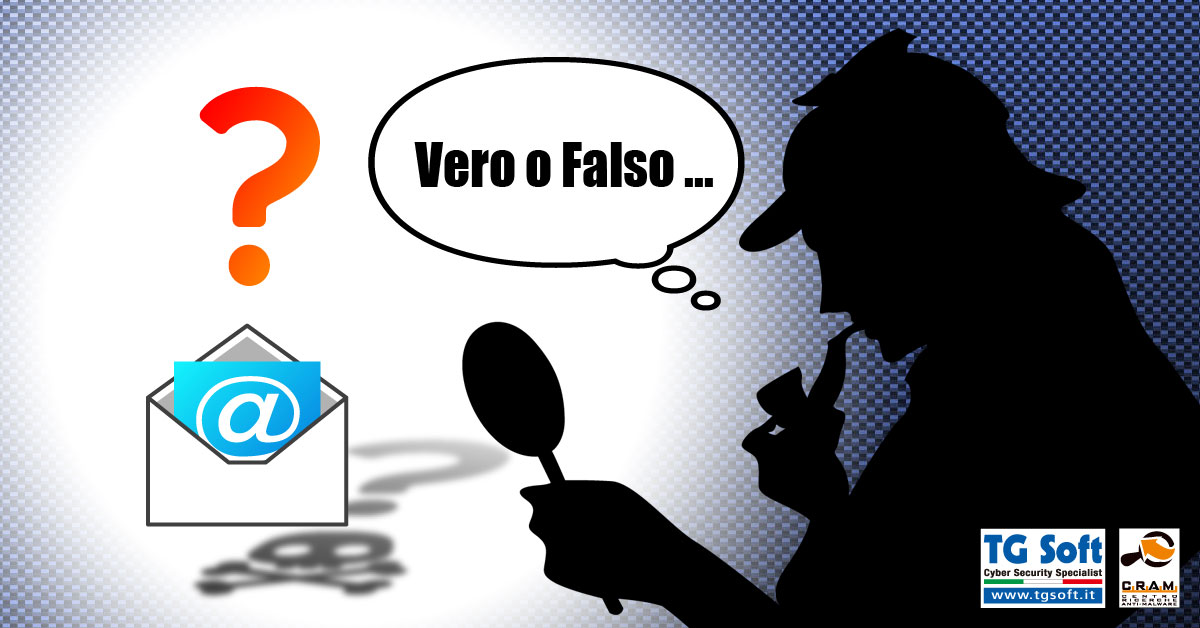
For more details on how to safely forward suspicious e-mails, we invite you to consult the following public page:
How to send suspicious emails for analysis
We provide all this information to help you prevent credential theft, viruses/malware or, even worse, next-generation Ransomware / Crypto-Malware.
TG Soft Anti-Malware Research Centre (C.R.A.M.)


 The message informs the receiver that as of today 21 July 2 new messages have arrived, which however have not been delivered to the mailbox hosted on Aruba. The reason for the undelivered messages seems to be a new management policy of incoming mail adopted by Aruba. It therefore invites the user to retrieve the suspended message through the following link:
The message informs the receiver that as of today 21 July 2 new messages have arrived, which however have not been delivered to the mailbox hosted on Aruba. The reason for the undelivered messages seems to be a new management policy of incoming mail adopted by Aruba. It therefore invites the user to retrieve the suspended message through the following link:
 "As you can see, this is not a formal email, and unfortunately, it does not mean anything good for you. But do not despair, it is not critical. I am going to explain to you everything righy now. I have access to your electronic devices, which are the part of the local network you regularly use. I have been tracking your activity for the last few months. How did that happen? You visited some hacked websites with Exploit, and you device was exposed to my malicious software (I bought it in Darknet from specialists in this field). This is a very complex software, operating as a Trojan Horse. It updates regularly, and your antivirus can not detect it. The program has a keylogger; it can turn your camera and microphone on and off, send filesand provide access to your local network. It took me som time to get access to the information from other devices,, and as of now, I have all your contactswith conversations , info about your locations, what you like, yor favourite websites, etc. Honestly, I meant nothing bad at first and that just for fun. This is my hobby. When I hacked into your email account, your password was:***. But I got Covid and unfortunately lost my job. And I figured out how to use “my hobby” to get money from you! I recorded video of you .. This video has a separated screen, where you can be easily recognised; also, it can be clearly seen what sort of video you prefer. Well, I am not proud of this, but I need money to survive. Let’s make a deal. You pay as much as I ask you to, and I won’t send this videoto your friends, family, and other acquaintances. You should understand, this is not a joke......."
"As you can see, this is not a formal email, and unfortunately, it does not mean anything good for you. But do not despair, it is not critical. I am going to explain to you everything righy now. I have access to your electronic devices, which are the part of the local network you regularly use. I have been tracking your activity for the last few months. How did that happen? You visited some hacked websites with Exploit, and you device was exposed to my malicious software (I bought it in Darknet from specialists in this field). This is a very complex software, operating as a Trojan Horse. It updates regularly, and your antivirus can not detect it. The program has a keylogger; it can turn your camera and microphone on and off, send filesand provide access to your local network. It took me som time to get access to the information from other devices,, and as of now, I have all your contactswith conversations , info about your locations, what you like, yor favourite websites, etc. Honestly, I meant nothing bad at first and that just for fun. This is my hobby. When I hacked into your email account, your password was:***. But I got Covid and unfortunately lost my job. And I figured out how to use “my hobby” to get money from you! I recorded video of you .. This video has a separated screen, where you can be easily recognised; also, it can be clearly seen what sort of video you prefer. Well, I am not proud of this, but I need money to survive. Let’s make a deal. You pay as much as I ask you to, and I won’t send this videoto your friends, family, and other acquaintances. You should understand, this is not a joke......." If you are not yet using Vir.IT eXplorer PRO, it is advisable to install Vir.IT eXplorer Lite -FREE Edition- to supplement the antivirus in use to increase the security of your computers, PCs and SERVERS.
If you are not yet using Vir.IT eXplorer PRO, it is advisable to install Vir.IT eXplorer Lite -FREE Edition- to supplement the antivirus in use to increase the security of your computers, PCs and SERVERS. For more details on how to safely forward suspicious e-mails, we invite you to consult the following public page: How to send suspicious emails for analysis
For more details on how to safely forward suspicious e-mails, we invite you to consult the following public page: How to send suspicious emails for analysis